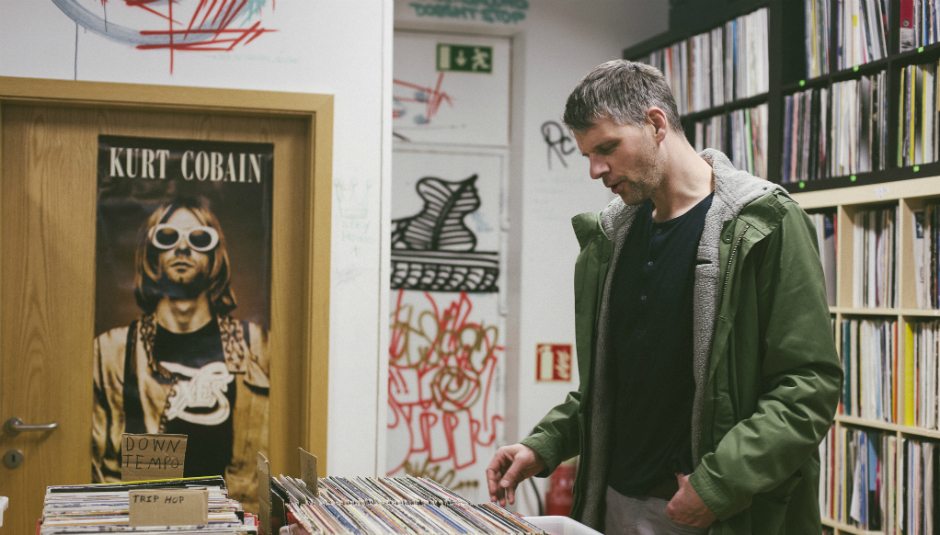“I believe that there is something different here. Not elves so much, but some kind of power,” says Grímur Atlason of his native Iceland. Atlason, the managing director and booker for the annual Iceland Airwaves festival knows that power firsthand. He was born on this island in the Atlantic, isolated and at the mercy of its brutal weather. The fickle ocean, the volcanoes, and the glaciers still shape Icelandic life as much as they did in Atlason’s childhood.
Atlason also came of age with a growing musical and artistic culture that’s made Iceland into a formidable exporter of music, from Björk to Of Monsters and Men. Atlason reflects on the punk-inflected bands of those early days, the importance of choirs, and the importance of filth.
Atlason, along with other notable Icelanders, appears in the new documentary The People Who Make Iceland, produced by Insure and Go.
DiS: How was Icelandic music formed? When and where do you feel it happened, specifically?
Grímur Atlason: When you think about it, we didn't have any music, really, in the past as such. It was rhymes. They were singing the rhymes. That was our interpretation of music. They were singing the rhymes, and it was literature. We come from a literature--like, the slaves we brought from Ireland and the Nordic people kind of merged into this literary nation that was reading and writing books in the 12th and 13th century. Which is rather good compared to the state of things here.
It was a really isolated place until 100 years ago or even less. We were really isolated. It was an island in the middle of the Atlantic Ocean filled with volcanoes, earthquakes, horrible weather, and it's pretty impressive that people did survive this into the 20th century. But culture has always been highly appreciated in Iceland and embraced in many ways. These Icelandic sagas that were written in the 12th, 13th century – they are state of art because the manuscripts are still preserved. Those manuscripts are 800 years old and really gems because they are one of a kind. They are our pyramids, they are our Mona Lisa. We have always been good at culture.
If you take that, and then you take the literary tradition in the 20th century, like the writers of the 20th century, the people that were painting, acting, we have always been good at that. We have been horrible bankers, though. We have, I think it's seventh, maybe even third largest bankruptcy in history. We were quite impressed with that, but culture has always been our thing. If you go back, we were not exporting music. We had this music, the classical scene was thriving, and those people were doing good things.
But on the side of contemporary indie pop music, we were not that successful if you go 30 years back. In the disco decade of '75 to '79, '80, something like that, music started to change in Iceland. Bands emerge that were kind of different. They were taking in these new influences, doing a different kind of music, and they came about with a really strong scene. And that scene was documented in a famous documentary, Rokk í Reykjavík that was released in April 1982, and that film changed the lives of a lot of young people in Iceland. I was one of them.
I was 11 turning 12 that year and in that documentary, you saw music from people like the band Purrkur Pillnikk that had the singer Einar Örn Benediktsson and the bass player Bragi Ólafsson that later became the Sugarcubes. Now we're back to Tappi Tíkarrass; that was Björk's first band. And then another band, Þeyr, with Sigtryggur Baldursson, who was the drummer of The Sugarcubes. These people, and a lot of other people made that scene. It was strong, and it was different, and it changed like a lot of young kids that started doing their own music, forming their own bands. And out of this we have a more thriving music scene, then later The Sugarcubes, our first success story in contemporary music or pop music. And of course Sugarcubes became Björk, and a lot of bands came after that. Múm, Sigur Rós – I would say this is the turning point and the turning point of the Iceland music revolution. Later, of course, in 1999, we had Iceland Airwaves coming in, and that became a window for opportunities for musicians to travel.
You spoke to the tradition of epic poetry and the sagas their impact on Icelandic music. Aside from those influences, are there certain qualities that you think define Icelandic music?
This is a tricky one. I would probably answer this differently if you asked me tomorrow. We might have some different sounds but on the other hand we have recent successful bands like Of Monsters and Men and Kaleo. I wouldn't say they sound Icelandic at all. They could be from anywhere. Kaleo could be from the US, and Of Monsters and Men as well. But Björk was a little bit different, Sigur Rós different, and Múm, those bands are different. People say each are kind of elfish looking bands. I don't think there are similarities in that but I think there are similarities in how these people work. They work a lot together. It's a small scene in reality, but we have many, many bands. A lot of them work together.
Iceland is known for having a language that's been very well-preserved over time. I was recently listening to an interview with Nadia Sirota and Anna Thorvaldsdottir, and they were discussing a potential relationship between the Icelandic language and Icelandic music. Like, maybe hearing and speaking a language with those sounds has contributed to the musical flourishing. What thoughts do you have about that?
I have mixed thoughts about it. If you take the opportunities musicians have abroad, even some bands like Sigur Rós, they don't even sing in Icelandic. They sing in Sigur Rós language. But it's like Björk and the Sugarcubes. The Sugarcubes did stuff in Icelandic, but they did stuff in English as well. Those were the albums that became successful abroad. So it has, in fact, sad as it might sound, affected bands if they're singing in Icelandic. Even though you have people saying “You should be singing in Icelandic; it's much better.” And you just can't. But on the island, it can be really non-natural to hear a band singing in English. It's more like a phoney thing. Icelandic is such a niche language because there are so few people speaking it. On the other hand, I love it when I hear people speaking it, and I love the language. I love writing it, reading it. But I also kind of understand there can be two sides to it. Some bands work out perfectly in Icelandic; some don't.
You alluded earlier to how long Iceland had been totally isolated. I feel like that isolation has probably led to having a well-defined national culture and identity. How do you think that's contributed to the music or the music business of Iceland?
Iceland is an island in the middle of the Atlantic Ocean with this history which I was describing and also with this harsh nature and the fact that we didn't have TV on Thursdays and beer was banned until 1989. Those kinds of facts, and also, as I said, the isolation and the nature and the wind and the snow and the sun and the ocean taking a huge toll every year and nature taking a huge toll every year – that has a lot to do with who we are, how we express ourselves in arts, music, or whatever. These days it's interesting to see how things are changing because the world is big but it's getting smaller and smaller, and people are talking to each other every other day. I'm talking to people in Australia. People are getting closer and closer and the chains from Dunkin’ Donuts to Starbucks to H&M to all these, everybody's doing the same kind of stuff, the same kind of clothing style and stuff like that. I think this will help these conditions I was describing where there was no beer, there was no TV on Thursdays and the fact that this island was really, really isolated. I don't know if it's going to be better or bad or good or whatever, but still, the fact that we are an island will always make a difference to the continental unit, even in England where you have a train that goes from England to Europe. We don't have that. The only way is to fly out, to take a ship that takes several days to get to another place.
How much does the Icelandic government support the arts, especially music? And what other options for funding do Icelandic musicians have?
There are several options. There are options for people writing books because this is really tough; you don't sell a lot of books when you write a book. So there are grants that you can seek. In music and the arts, we are pretty decent when it comes to grants. You could say it's getting better and better. Say a musician, like a band or anyone who is practising music and wants to succeed in that, wants to export his talent, he needs to train and you don't train your style playing live shows in Iceland. It's impossible because it's such a small, small market. You'll do one show a year and then you have fulfilled the market. You need to get abroad, so you always need, say, $2,000 just to get off the island. Then you need to hire a band. Then you need a house to stay in. This is the only way to train. And you need to train your skills and you need to perform and it is really important to get some support around that. But grants can also be paralysing because some people are like, if they get too much, it slows them down. You need to fight for it a bit.
Can you speak a little about music education in Iceland, both for children and for adults?
We are good on that. Young kids, especially when you're in the countryside, you can easily get access to music. Often, it's related to just going to public school. You will get a musical education in public school and sometimes the music school is connected directly to the public school. It varies. In Reykjavik, we have several music schools. They are not for free, but on the other hand, you get support from the municipality to participate or send your kids to this. So a lot of kids have access to it. When you get to later stages, there are good musical universities here in Iceland. But in a small country, it's healthier for people that are promising in anything to go abroad to study. Foreigners come here to study as well, so that's cool. I always have this kind of thing where you are in a small village, it's healthy for you to go to the big city and do something there and come back when you've done that.
A lot of Icelanders sing in choirs, community choirs and professional ones alike. I'm curious about the significance of the choir, both socially and musically.
It's really important, especially when you go around the island. The church choirs of the villages of Iceland – that's been, it's like a social hub for people. People meet once or twice a week to practice, and then you have Mass and stuff like that. Then you have the men's choir of this place and women's choir of that place and some choirs who are more professional and then the choirs of the high schools. Like the highest one here is at my high school, which was kind of progressive in Reykjavik. This school is a place for a lot of musician/artist people or just regular people seeking education. There’s a high school choir, Menntaskolinn við Hamrahlid, that has been going for almost 50 years now, and a lot of musicians now come out of that choir. So it's really important in all aspects, just as a social thing for the small municipalities around the island and also as an educational thing for people getting into the real business of music. I don't know how many choirs there are in Iceland. There are a lot of choirs.
When I listen to certain contemporary Icelandic musicians, I hear a lot of classical influences, whether it's outright composers like Daníel Bjarnason or hybrid musicians like Valgeir Sigurðsson. Why do you think that classical music has retained such prominence in Icelandic music, even so far as to affect popular music?
I think it's also just because they're open-minded, these people. Like Valgeir Sigurðsson doing Bedroom Community – it's a community of those people. They're doing pop music but they are also into classical music. They lure people all over the world to work with them, perform with them, do something like collaborations. Daniel Bjarnason, who's not part of this but is also a composer and writes music for just regular symphony orchestras. A lot of musicians are in a pop band but also doing classical music, playing with a symphonic orchestra. Björk started using the string players, Sigur Rós used amiina, who is now a band. They played with Sigur Rós, they were like the backing band for Sigur Rós in the States. All this hits on classical education. And then it's just like open-minded musicians that collaborate together, make communities like Bedroom Community or other communities. Then you have guys like Johann Johannsson. He comes from the country. He played in a marching band when he was a kid, playing the trombone, and then he was the singer in a punk band. Then he started composing. All these people, they started influencing other people. They tore down barriers, the barriers between classical and un-classical, whatever you call it. It's just music.
I've been reading about the different events that they have going on at [Harpa] (https://en.harpa.is/), the new concert hall they have in Reykjavik. When there is a splashy new venue like Harpa in a city, how does that alter the landscape of what goes on musically?
Harpa is our Sydney Opera. It's a landscape in Iceland that draws tourists as well to see it. I think it's a really good thing. There's a downside to it, though. It takes away the filthiness of the rock festival. For Iceland Airwaves, we're going to cut down Harpa significantly. We are going to cut down a lot of venues in Harpa. We are only going to use one of them. We are going back to the beginnings. I'm looking forward to that. We're just going to reinvent ourselves a bit.
That's wonderful. What inspired you to do to that?
One thing is the filthiness. We might go to Harpa. It's just changing the scenario. Another significant factor to this is there are too many things going on in Iceland at the moment. We have four festivals happening that are all after the same thing – international people who come and selling a lot of tickets. And then we have, on top of that, endless individual shows. A lot more than ever before. When you have that going on, I think it can be smart to weather the storm.
My last question for you, based on what you've been hearing, what movements and trends will we be hearing next in Icelandic music?
At the moment, there's a lot of really interesting hip hop going on in Iceland, but that's a thing that is happening all around the world. It's a global phenomenon, but [Icelandic hip hop artists] are cool and good. I don't know if it can translate to other countries. It's always difficult with hip hop because even U.K. hip hop has been having difficulties to get across the pond to the US. The US has been dominating the hip hop market worldwide. There have always been local hip hop acts, but this is the musical genre that is really the thing now. I also think there's really good electronic singing, like the artist Pjarki who is based in Berlin. That scene is really taking off as well. He's relatively new, and he's taking off nicely. The indie scene is strong also. We have some indie bands releasing records. Like Mammút is coming. We've got Agent Fresco released in the world. That is something that's interesting to follow up on, interesting to see how it will go. Hip hop is the dominant style here in Reykjavik and across the country. But interesting people like GKR are out there. I will definitely follow up what he is doing.
How is Icelandic hip hop different from US hip hop?
They go into these different hip hop schools. They're this style of hip hop or that style of hip hop. I'm not an expert on the topic but of course, there's maybe more intellectual hip hop here, some of it, where they're singing in Icelandic and using more literature to it. The words, the phrasing and stuff, if you could call it intellectual, I would say that. Then you also have hip hop more like the Drake school, these Ae$op guys, all of that. We have that kind of hip hop as well. But the Icelandic thing is that the most popular guys are singing in Icelandic. They're bringing a lot of drums and live guitar to it as well. That's getting really popular. But we are still getting the Drake school. And there is also the Sturla Atlas (+ 101 Boys).
For more information about Grímur, and the Insure & Go campaign People Who Make Iceland, please click here.






















